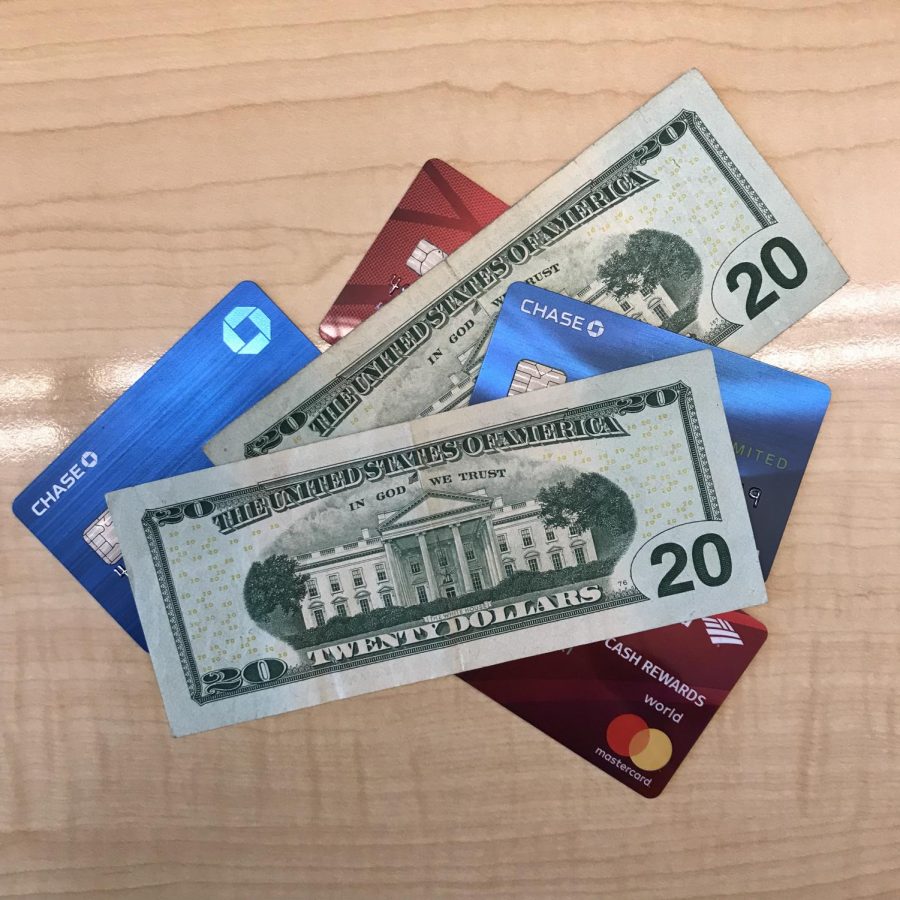It’s All About the Money, Money, Money
A finance class offered in high school would increase the success of students after graduation. Learning about key concepts in finance enables students to make financially responsible decisions.
Apr 27, 2018
Leaving high school is like being hit with a tidal-wave of relief; with this relief comes the dawning realization that we have to be adults now. Uh-oh.
That means: credit cards, loans, mortgages, taxes, bills, and so much more we’ve had absolutely no instruction on. Ever since the collapse of the housing market in 2008 and subsequently the economy, financial ignorance has been on the rise; there is less money in circulation and the average income is lower than it’s been in years 2. As millennials and generation Z are growing up, it’s important for us to know a thing or two about money before being bombarded with the real world. In order for high schoolers to be truly prepared for the future, there must be a widely-available finance class to educate students on how to be financially stable and responsible as adults in an ever-increasing finance-dependent world.
People warn us about credit cards, but forget to teach us how to use them; people warn us about loan sharks, but forget to teach us how to avoid them. Credit card companies are banking on the assumption that fresh graduates don’t know a thing about money, and they’re right; we don’t. Signing up for a credit card brings the feeling of maturity, that is, until $100 borrowed turns into $400 owed. Now we’re in debt and don’t know how to get out of this hole we’ve dug ourselves into.
One way to prepare students for the future is to create a required finance class that teaches fundamental concepts of personal finance so students can be financially apt in areas like loans, mortgages, and insurance after high school. This is the stuff you’ll actually use for the rest of your life.
Curriculum should be based on the financial happenings of the world, meaning it shifts as the economy does. If the housing market is booming, students should be learning about mortgages and real estate. Learning basic personal finance skills will lead students to be confident in their financial literacy, thus making them less likely to make a rudimentary mistake in the future, when all responsibility is their own 3. Focusing on elementary aspects of finance, like loans, mortgages, and credit cards, will create a sense of security for students as they graduate high school and begin fending for themselves. Methods of teaching financial literacy include things like games and competitions 3 so that students comprehend the objectives of finance and have fun while doing it. Teachers play a vital role in this endeavor; they should engage their students in financial discipline and teach them how to use their money responsibly.
With knowledge comes the ability to thrive. Another benefit to finance classes is that they give students the confidence needed to be financially responsible after high school. Leaving high school is scary for countless reasons: one of these is the daunting task of being in charge of your own money. Using it, borrowing it, paying it back, living on a budget, all of these things add to the mounting pile of anxiety many students face as they walk away from high school. A personal finance class will bolster the self-esteem of a student and prompt them to be financially responsible for years to come.
Although only a select number of states have actually integrated finance classes in high schools, the results of this change have not been verified as significant due to such a recent add; not enough time has passed to make a definitive connection between high school finance classes and holistically better financial literacy. In a survey conducted by the Council for Economic Education (CEE), no state has been added to the list of requiring a finance class since 2016 1.
Increasing awareness and knowledge about personal finance will not only better prepare high schoolers for post-graduation, but will inspire a generation of innovative thinkers and better the economy 1. Brining finance into community folds will create a powerful ripple effect across the nation. Students are the future, they should be given all the resources possible to change the world.
- Council for Economic Education. (n.d.). Survey of the State: Economic and Personal Finance Education in Our Nation’s Schools. Retrieved from https://www.councilforeconed.org/wp-content/uploads/2018/02/2018-SOS-Layout-18.pdf
- Goldman Sachs. (n.d.). Millennials Infographic. Retrieved from http://www.goldmansachs.com/our-thinking/pages/millennials/
- National Financial Educators Council. (2016, December 28). Benefits Of Teaching High School Personal Finance. Retrieved from https://www.financialeducatorscouncil.org/benefits-of-teaching-high-school-personal-finance/






